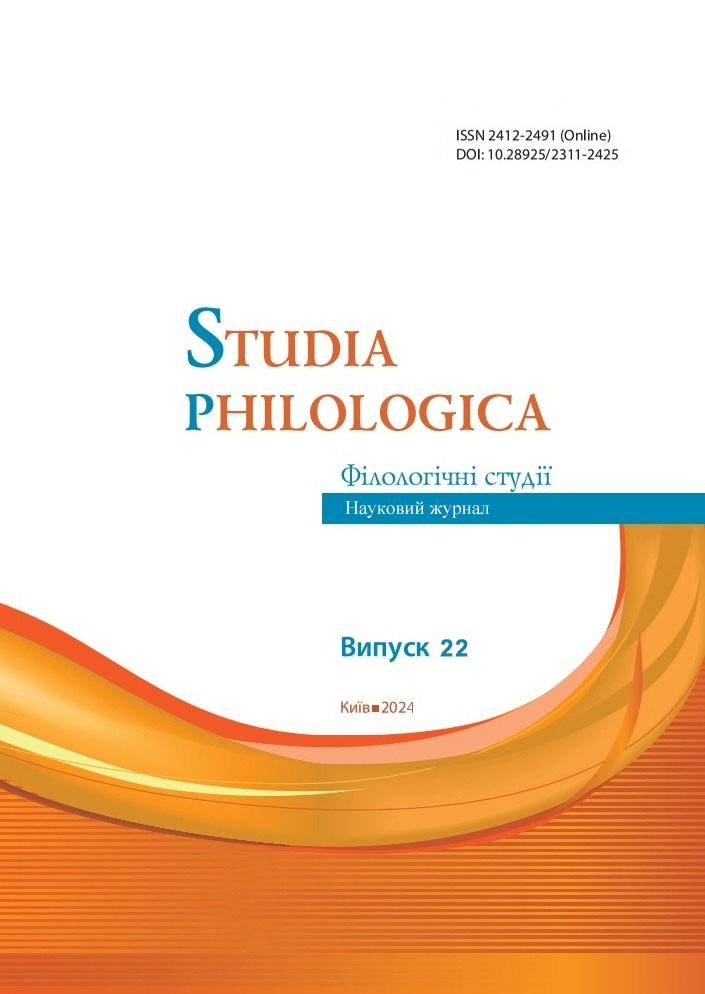Discursive Features of United States Foreign Policy Rhetoric Towards the Middle East
DOI:
https://doi.org/10.28925/2412-2491.2024.2214Keywords:
critical discourse analysis, identity, political discourse, power relations, discursive strategies, foreign policy rhetoric, American exceptionalism, the United States, the Middle EastAbstract
In the contemporary international order, marked by increasing global interdependence and complex power relations, understanding the role of the United States as a global actor is crucial. This paper explores the interplay between American identity, discourse, and U.S. foreign policy rhetoric, particularly in its engagement with the Middle East. Rooted in the concept of American exceptionalism, it investigates the selective and strategic nature of U.S. rhetoric towards key Middle Eastern actors. The research integrates linguistics and international relations, with Critical Discourse Analysis as the primary theoretical framework. By addressing research questions concerning American identity, discursive strategies and their linguistic realisations, and rhetorical selectivity, this paper contributes to a deeper understanding of U.S. foreign policy rhetoric towards the Middle East.
Downloads
References
Billig, M. (2003). Political rhetoric. In D. O. Sears, L. Huddy, & R. Jervis (Eds.), Oxford handbook of political psychology (pp. 222–250). Oxford University Press.
Bisley, N. (2012). Great powers in a changing international order. Lynne Rienner Publishers. https://doi.org/10.1515/9781588269744
Buzan B. & Wæver O. (2003). Regions and powers: the structure of international security. Cambridge University Press.
Chilton, P. (2004). Analysing political discourse: Theory and practice. New York.
Chilton, P., & Schäffner, C. (Eds.). (2002). Politics as text and talk: Analytic approaches to political discourse (Vol. 4). John Benjamins Publishing.
Dontcheva-Navrátilová, O. (2017). Coherence in political speeches. Brno, Czech Republic: Masaryk University. https://doi.org/10.5817/CZ.MUNI.M210-8859-2017
Dunmire, P. L. (2012). Political discourse analysis: Exploring the language of politics and the politics of language. Language and Linguistics Compass, 6(11), 735–751. https://doi.org/10.1002/lnc3.365
Esser, J. (1993). English linguistic stylistics. Max Niemeyer.
Fairclough, N. (1989). Language and power. London and New York: Longman.
Fairclough, N. (2003). Analysing discourse. Textual analysis for social research. London: Routledge.
Flick, U. (2002). An introduction to qualitative research (2nd ed). Sage Publications.
Glaser, B. G., & Strauss, A. L. (1967). The discovery of grounded theory: Strategies for qualitative research. Aldine publishing company.
Halliday, M. A. K. (1973). Explorations in the functions of language. Edward Arnold Ltd. London.
Halliday, M. A. K. (1985). An introduction to functional grammar. Edward Arnold.
Halliday, M. A. K. (1989). Spoken and written language (2nd ed). Oxford University Press.
Hixson, W. L. (2008). The myth of American diplomacy: National identity and U.S. foreign policy. Yale University Press.
Hoey, M. (2001). Textual interaction: An introduction to written discourse analysis. London, New York: Routledge.
Huntington, S. P. (2005). Who are we?: The challenges to America's national identity. Simon & Schuster Paperbacks.
Jeffries, L. (2010). Critical stylistics: The power of English. Palgrave Macmillan.
Kagan, R. (2004). Of paradise and power: America and Europe in the New World Order. Random House Large Print Publishing.
Mead, W. R. (2013). Special providence: American foreign policy and how it changed the World. Routledge.
Mertus, J. (2003). The new U.S. human rights policy: A radical departure. International Studies Perspectives, 4(4), 371–384. http://www.jstor.org/stable/44218847
Muntigl, P. (2002). Politicization and depoliticization. In Discourse approaches to politics, society and culture 2 (pp. 45–79). https://doi.org/10.1075/dapsac.4.05mun
Obama, B. (2010). National Security Strategy. Retrieved from https://obamawhitehouse.archives.gov/sites/default/files/rss_viewer/national_security_strategy.pdf
Restad, H. (2012). Old paradigms in history die hard in political science: US foreign policy and American exceptionalism. American Political Thought, 1(1), 53-76. https://doi.org/10.1086/664586
Reyes, A. (2008). Discursive strategies in Chávez’s political discourse: Voicing, distancing and, shifting. Critical Discourse Studie, 5 (2), 133–152. https://doi.org/10.1080/17405900801990074
Reyes, A. (2011). Strategies of legitimisation in political discourse: From words to actions. Discourse and Society, 22(6), 781-807.
Simpson G. (2004). Great Powers and Outlaw States: Unequal Sovereigns in the International Legal Order. Cambridge Studies in International and Comparative Law. Cambridge University Press.
Strauss, A., & Corbin, J. (1990). Basics of qualitative research: Grounded theory procedures and techniques. Sage publications.
Szpunar, P. M. (2013). The horror at Fort Hood: Disseminating American exceptionalism. Media, Culture & Society, 35(2), 182-198. https://doi.org/10.1177/0163443712468607
Van Dijk, T. A. (1998). Ideology: A multidisciplinary approach. Sage Publications, Inc.
Van Dijk, T. A. (2006). Discourse and Manipulation. Discourse and Society, 17(2), 359-383.
Virtanen, T. and Halmari, H. (2005). Persuasion across genres: Emerging perspectives. In: Halmari, H. and Virtanen, T. (Eds.) Persuasion across Genres. Amsterdam and Philadelphia: John Benjamins. 3-24.
Wetherell, M., Yates, S., & Taylor, S. (2001). Discourse theory and practice: a reader. Sage. http://www.loc.gov/catdir/toc/fy02/2001278564.html
Wodak, R. (1989). Language, Power and Ideology: Studies in Political discourse. John Benjamins Publishing. Amsterdam.
Wodak, R. (2001). The discourse-historical approach. In R. Wodak, & M. Meyer (Eds.), Methods of Critical Discourse Analysis (pp. 63-95). Sage.
Wodak, R. (2007). Pragmatics and Critical Discourse Analysis: A cross-disciplinary inquiry. Pragmatics and Cognition 15(1), 203-225.
Yergin, D. (2006). Ensuring energy security. Foreign Affairs, 85(2), 69–82. https://doi.org/10.2307/20031912
Published
How to Cite
Issue
Section
License
Copyright (c) 2024 CC BY 4.0 DEED Attribution 4.0 International

This work is licensed under a Creative Commons Attribution 4.0 International License.


